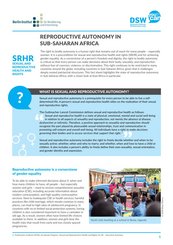
In this fact sheet, the DSW and the Berlin Institute take a look at the situation of reproductive rights in Sub-Saharan Africa.
Read more
In many low- and lower middle-income countries, particularly in Africa, populations are growing rapidly. In the early stages of the demographic transition, they must meet an increasing number of people’s essential needs, such as health care, education and food. Countries that are already experiencing shifts in their population age structure and where the share of the working-age population is rising often struggle to provide their young populations with decent jobs. How can these countries increase their chances of capitalizing on this demographic change to promote human potential? Interventions in key sectors such as health, education and employment are needed to accelerate socioeconomic progress to harness the potential of a demographic dividend.
Recognising the potential for carefully targeted population policies to deliver demographic dividends, UNFPA, the African Union Commission and the Government of Germany launched #The4DSeries policy dialogue on demographic dividends and diversity in 2020. Six dialogues were convened through 2023, creating a platform for exchange, where participants learned from one another and developed key points for action to inform policy planning and guide governments in finding country specific solutions. The Berlin Institute provided technical and scientific inputs for each dialogue, which focused on topics including data, food security and nutrition, education, adolescent sexual and reproductive health and rights, urbanisation and climate resilience.
This report is based on the dialogues’ Event Reports and Food for Thought Papers, bringing together best practices and policy recommendations for unlocking demographic dividends. It is an important tool for governments and civil society to inform policy planning and implementation to promote and achieve sustainable development.
Project Coordinator International Demography
Telefon: +49 - 30 31 01 95 91
Contact via Mail: rose@berlin-institut.org
© Berlin-Institut
Executive Director
Telefon: +49 30 - 22 32 48 45
Contact via Mail: hinz@berlin-institut.org
© Berlin-Institut